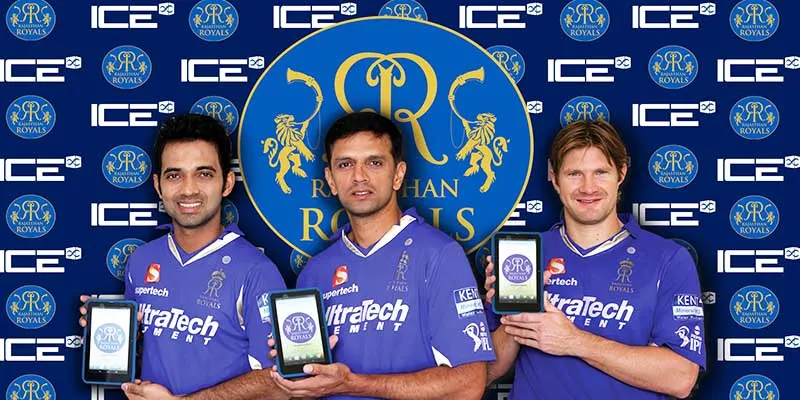3 IITians crack the affordable devices market, make INR 50 crore in first year
Is it possible to build affordable smartphones and tablets for the mass market without being tagged as 'Low Quality'? Most of us would say No. Yet, 3 IITians -- Ravi Jakhar, Aditya Agrawal and Rohit Sharma – have been proving otherwise with their Mumbai-based startup, ICE X Electronics. Within a year of their products entering the market, they have clocked sales of INR 10 crore in their own brand, and about INR 40 crore in other brands. The key to it is their refusal to compromise on quality, focusing instead on technological innovation to make their products affordable.
“Our industry (affordable smartphones) is branded as highly commoditized, the general perception being that companies are importing handsets and tablets from China and selling them here under their own brand names. We also work with Chinese manufacturers. However, we don’t just import products from there. At ICE, everything, from product conceptualisation to technology integration, is done by us,” says Aditya. An IIT BHU and IIM Indore graduate, Aditya has worked with top companies like E&Y and Bharti Airtel. He specializes in telecom practice.

A gap in the smartphone market
In 2010, Ravi was advising several companies on organic and inorganic growth when he began interacting with some of the leading Indian handset manufacturers. After a series of discussions on fund-raising, he realized that most of them were able to build their business on distribution strength with little focus on technology innovation. He saw this as a gap in the business chain. He reached out to his college mates, Aditya and Rohit. Together, they launched ICE X Electronics in 2011. The vision was to build affordable smartphones and tablets for the Indian consumer with a clear focus on technology and innovation.
The company started its operations with a small team of six people, which gradually grew to 25, while keeping all non-core activities on an outsourced model.
Right from the start, the 3 founders were clear that to succeed in the crowded space, they had to innovate and differentiate wherever possible.
For instance, the core chipset for tablets is built for global users and the first such chipsets for wifi tablets did not have support for dongles from Indian operators. Besides, wifi coverage in India is very limited. So a lot of people who purchased wifi tabs initially could not use them well due to lack of wifi hotspots. “We worked with the chipset developers and got patches built to solve dongle issues and hence our tablets could be supported by all the major Indian dongles,” Aditya says.
“Even after the final assembly of devices, there are a lot of bugs which emerge in the software, thus leading to unsatisfactory user experience. A PCBA developer made a PCBA for a calling tablet, which was used by us and others as well. However, we were the only ones who launched the final product with calling tray and free of bugs,” he says.

Technical expertise is their forte. “We are the only Indian company in its domain which is working on latest technologies such as wireless charging, 3D printing, 22 language keyboard solutions, own OS etc. all of which help in making better devices for the end-user. We have a tie-up with FTK Technologies, an Israel-based company, to launch India’s first 22 language-enabled tablet,” Aditya says.
It doesn’t end at sales
All ICE tablets come pre-loaded with a customer service app, which customers can use to get online help to fix small problems immediately – “This is a first from ICE,” Aditya says.
Apart from tie-ups with more than 400 third party service arrangements, the company also provides for a pickup and drop of devices after repair. Customers can call a toll-free helpline number to log in their complaint and request for device pickup. “ICE is the first company to launch a concept of doorstep after-sales service for tablets and smartphones, which is now being upgraded to an 'engineer at home' service,” he adds.
Currently, the company is piloting a new model of after sales service. They have hired repairmen to go to the customer’s house with a tool kit and repair the device at home. “This is a model frequently used by consumer durable companies but unheard of in the mobile and tablet segment,” Aditya says.
To boost their sales network, they are piloting a new model of sales too.
1. Campus Ambassadors
ICE has tapped into college campuses, a hot market for affordable tablets and smartphones. They appoint ‘Campus Ambassadors’, who are generally students perceived as influencers in the campus. These ambassadors promote and use ICE products, resulting in sales in the campus. The ambassadors also help their friends in case of any after sales service. “We have recently hired a few interns from IIT to identify campus ambassadors in more than 500 colleges over the next 2 months,” Aditya says.
2. Society Ambassadors
ICE is also experimenting with a new model of sales at the co-operative society level. The company is planning to touch base with housewives who have a large social network in their housing societies. These ‘Society Ambassadors’ will use and promote ICE products among their groups.
Challenge of changing perceptions
The biggest challenge before ICE was how to fight perceptions in the mind of general consumers that affordable handsets aren’t reliable, especially China-made handsets. “This perception has emerged because most other players have been importing low quality devices, and many consumers don’t think about the fact that China is the manufacturing hub for all brands, including Apple,” Aditya says. ICE tackled this by persisting with their focus on quality, and “over a period of time helped our supply partners understand how much of a difference a focus on technology can bring.”
The biggest regret Aditya nurses is that they couldn’t launch ICE sooner. “There were many firsts from the ICE stable and we couldn’t tell our consumers about it because we were so focused on bringing the best technology innovation to our phones and tablets that we didn’t give marketing its due.”

Initially, the founders took a business call to go directly into the retail model. Typically, if you sell through retail outlets, the dynamics of the industry are such that there will be delays in payment collections. So if you don’t have an alternative sales channel supporting your business, going directly to the retail network can sometimes prove more of a roadblock. “Currently, we sell through all channels, including prominent ecommerce sites like Flipkart, eBay and Amazon. We have also launched our own exclusive online store icedigitalstore.com.”
The company has been funded internally, with the founders investing about INR 4 crore. “We have a turnover target of INR 100 crore this fiscal year. For this, we will be looking at raising some capital now from external investors,” he says.
Website: http://www.icexelectronics.com/
Do you think ICE can capture the affordable devices market with tech innovation? Share your take in the comments below.







